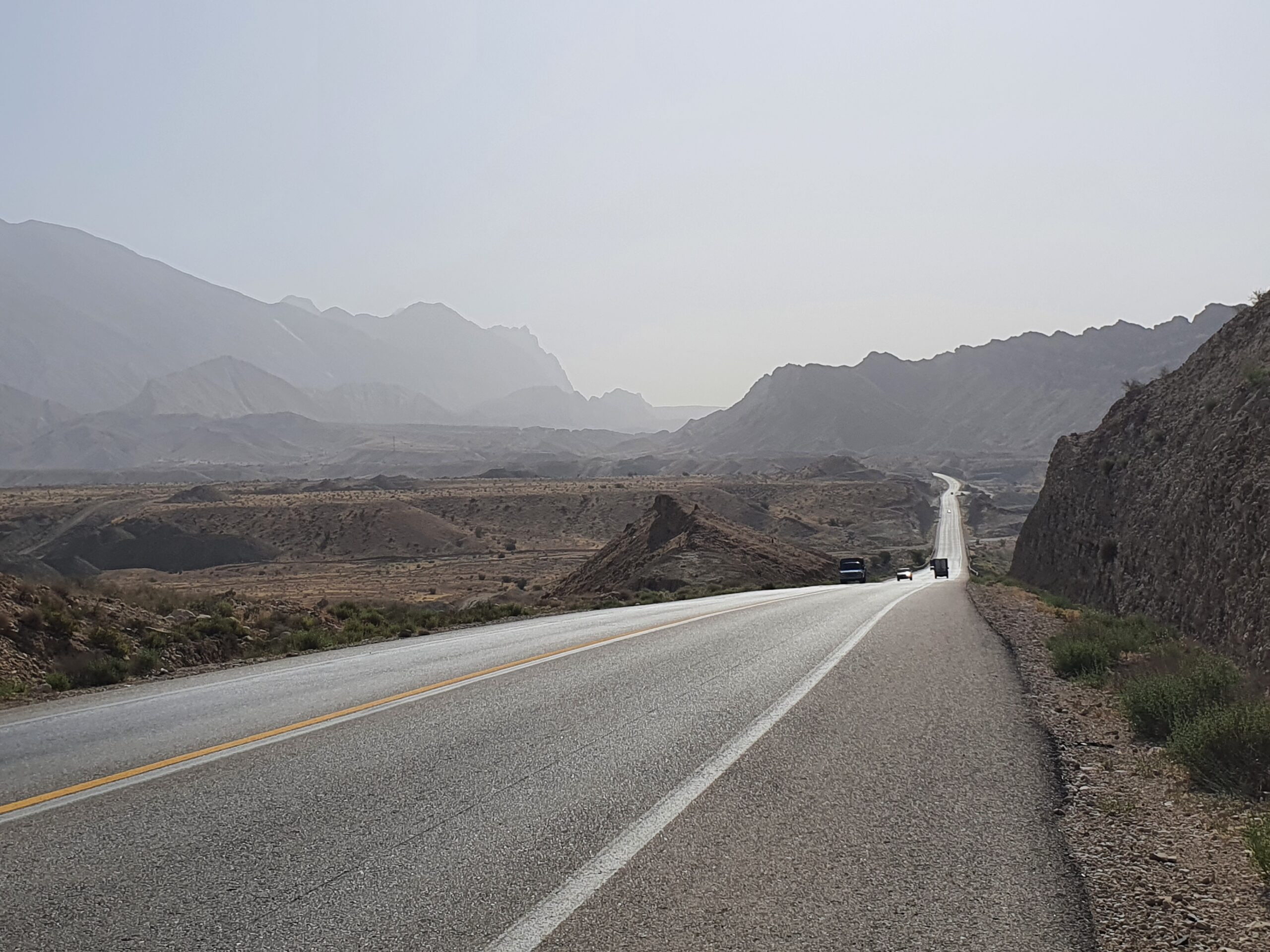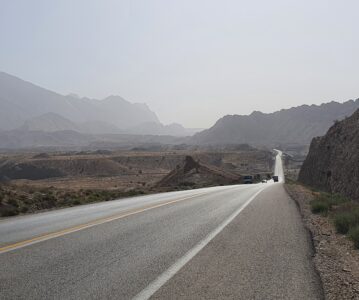At the latest when we leave Qir, we realize that we now have to say goodbye to pleasant temperatures for some time. Our early morning drive takes us through never-ending date palm forests; iridescent blue birds warble their morning songs and bare hills line the horizon.
The houses here are cubic and mostly built on one level and are the same color as everything else. Light brown, sand-colored, speckled only by small bushes and single palms and trees that can survive the midday heat. Sometimes the ground is covered with blond grass and we expect a herd of zebras around every bend. There is little traffic; apparently this is more of a back road. Small calculations with the map app show that we can expect less civilization for the next 80 kilometers. These distances will only increase over the next few days and we will have to think a bit more ahead regarding water and food supplies. Driving is now only possible early in the morning and if necessary later in the afternoon. From 11 o’clock it is blisteringly hot and the sun hammers relentlessly on our helmets.
The long lunch breaks outside are not very relaxing, even if we spend them mostly in a sticky half-sleep. It is much better when Hassan invites us to his cooled home in the small town of Evaz. The large family of Afghan origin welcomes us shyly but warmly and despite Ramadan we are served some delicacies without being asked, which were probably already cooked for the breaking of the fast in the evening.
Hassan and his nephew are only exceptionally present. The two work in Dubai in Natel stores and speak therefore excellent English. The 18-year-old nephew thus provides for his four younger siblings and parents. Dubai is close by. The flight takes only 30 minutes and there is a small international airport just around the corner. Over the next few days, we repeatedly feel the pull of Dubai. Countless fathers and sons work in the glitter metropolis and earn good money doing so. What a different reality of life, when the men have to live in this other world for months, sometimes for years, in order to work!
More hot driving days and sticky nights follow until we finally reach the Persian Gulf. The landscape here is moonlike despite the proximity to the water. Huge pointed mountains tower up, partly consisting of a kind of salt stone. Here there are hardly any villages, hardly any houses, only the road that leads us directly to a small harbor town. Here, too, everything is deserted, it is lunchtime and only the stop in the refrigerated grocery stores gives us some brief relief.
We don’t hesitate for long and take the ferry to the island of Hormuz- where of course it continues in the same manner. Heat, sand, merciless sun. After a stop in a run-down but cooled clothing store, we overcome ourselves to the last 10 kilometers to the small village of Bandar e Laft. Here we sit out the afternoon heat under the shade of a mosque and find ourselves a place to stay with AC towards evening. The beauty of the place is quite to be guessed: The narrow streets of the village are largely untouched by modernization. The traditional mud houses are crowned by the large wind towers that, thanks to an opening in each cardinal direction, always direct the wind into the living rooms, replacing the modern fan. Today, many houses have a cooling pump and the wind towers are only preserved as historical eye-catchers. In the port of Bandar e Laft, the huge, wooden Lengi boats are anchored, which in the past and today are used to transport goods to the Arabian Peninsula and also to various African ports.
The next hot day becomes a lot more bearable thanks to the acquaintance with the two Basques Cristina and Carles. The two spend their time as retirees half in their huge overlanding truck somewhere in the world and the other half as grandparents in Barcelona.
We are allowed to sit down in front of the van in their “parlor” and are spoiled with an iced coffee. Wonderful. Soon we decide to spend the afternoon with them and find a suitable swimming spot. We lock our bikes and watch the landscape pass by from truck height for once. Not so easy to find a “swimmable” spot next to all the magrove trees. Swimming is officially forbidden for women on Qeshm and so Carles parks the truck on a lonely beach. How wonderful to spend the afternoon in the water. At the latest, the condensation on the body brings the longed-for cooling! The two rise even higher in their hero ranks when they invite us to a wonderful Greek salad and omelet. Our wildest culinary dreams come true! As the heat becomes more bearable, we say goodbye to the two adventurers, reach our bikes by car stop without any problem and set off to cross the island. Another car stop brings us the consequential acquaintance with Fatema and her husband. We have been standing at the intersection for a few minutes without success, when their big pick-up truck stops and is ready to take us the hoped-for ten kilometers across the island. We intend to camp at the stand there. Of course, everything turns out differently. Fatime, unlike her husband, speaks fluent English and when she realizes that we want to spend the night here on the beach, she unpacks all the good arguments to get us to come home to them after all. “Today is Eid, the last day of Ramasan. This is a once in a lifetime opportunity for you to see that festival”- she immediately unpacks the really good reasons. We finally let ourselves be persuaded, also because the prospect of being able to exchange ideas with a young, fully veiled, self-confident woman is very tempting. Now we realize that the two of them have by no means given us a lift on their natural route, but have driven the whole way just to help us along. So we whiz back nine of the ten kilometers to soon turn into a pretty farm with a pretty house, which is the home of the husband’s family here somewhere in the middle of nowhere. Fatime and her husband are very newlyweds and just back from their honeymoon in northern Iran. “Every night in a different hotel- I didn`t like it!”, Fatime comments. When I ask her what it will be like to live on such a small, dry island after the wedding, she resolutely waves it off. “I will never live here! I live in UAE and we will go back there soon!” Only for the wedding do the two spend time here. Until before the wedding, Fatime worked at Dubai International Airport in immigration. So she has a lot of experience with travelers of all kinds, the global feel and lifestyle, and also with the working world. Her new husband doesn’t want her to work. “Doesn’t that bother you?”, I ask in wonder. Fatime laughs out loud and shakes her head vigorously. “Nooo!” she exclaims. “If he can pay all my bills, why should I work? All those different working hours, stress, sometimes we have unfriendly customers… I prefer to be at home, spending time with my nephew and with my bird!” We all laugh a lot that evening, comparing our so different lives. Louie quickly finds that he would also prefer to be at home and that I should just go to work. But why do we Swiss women have such a strong urge to work outside the home? Is it the fear of dependence? Or is it really the desire to work?
The conversation becomes really funny when Fatime explains her true intentions for the evening: She was sitting in the car because she wanted to spend as little time as possible with her husband’s urbane relatives, so she persuaded him to drive around a bit instead. Then we exhausted cyclists came as called. When the opportunity arose to invite us home, the plan was perfect: guests are kings and want to be entertained, and who better than the only English-speaking woman in the house? Win-win, then. Fatime can spend the evening away from the curious new relatives and we get delicious sweet pastries and dinner and a cool place to sleep.
Our Eid experience is somewhat less family-oriented than expected, but the encounter with the spirited Fatime with the hearty laugh is a further enrichment of our range of encounters.
The icing on the cake is that the young couple chauffeurs us again to the other side of the island early the next morning, making our day of cycling much easier.


